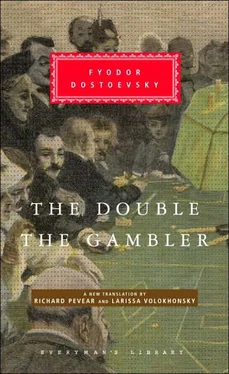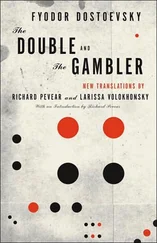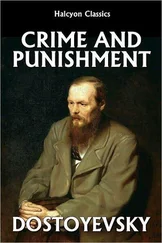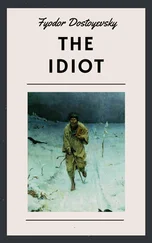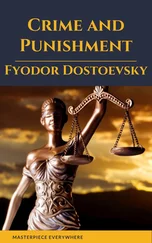Fyodor Dostoevsky - The Double
Здесь есть возможность читать онлайн «Fyodor Dostoevsky - The Double» весь текст электронной книги совершенно бесплатно (целиком полную версию без сокращений). В некоторых случаях можно слушать аудио, скачать через торрент в формате fb2 и присутствует краткое содержание. Жанр: Классическая проза, на английском языке. Описание произведения, (предисловие) а так же отзывы посетителей доступны на портале библиотеки ЛибКат.
- Название:The Double
- Автор:
- Жанр:
- Год:неизвестен
- ISBN:нет данных
- Рейтинг книги:4 / 5. Голосов: 1
-
Избранное:Добавить в избранное
- Отзывы:
-
Ваша оценка:
- 80
- 1
- 2
- 3
- 4
- 5
The Double: краткое содержание, описание и аннотация
Предлагаем к чтению аннотацию, описание, краткое содержание или предисловие (зависит от того, что написал сам автор книги «The Double»). Если вы не нашли необходимую информацию о книге — напишите в комментариях, мы постараемся отыскать её.
Poor Folk.
The Double
The Double — читать онлайн бесплатно полную книгу (весь текст) целиком
Ниже представлен текст книги, разбитый по страницам. Система сохранения места последней прочитанной страницы, позволяет с удобством читать онлайн бесплатно книгу «The Double», без необходимости каждый раз заново искать на чём Вы остановились. Поставьте закладку, и сможете в любой момент перейти на страницу, на которой закончили чтение.
Интервал:
Закладка:
The thing is that he now finds himself in a quite strange, to say the least, position. He, ladies and gentlemen, is also here, that is, not at the ball, but almost at the ball; never mind him, ladies and gentlemen; he is his own man, but at this moment he is standing on a path that is not entirely straight; he is now standing—it is even strange to say it—he is now standing in the hallway to the back stairs of Olsufy Ivanovich’s apartment. But never mind that he is standing there; he is all right. He is standing, ladies and gentlemen, in a little corner, huddled in a place not so much warm as dark, hidden partly by an enormous wardrobe and some old screens, among all sorts of litter, trash, and junk, hiding for a time and meanwhile only observing the general course of events in the capacity of an external onlooker. He, ladies and gentlemen, is only observing now; he may also go in, ladies and gentlemen…why not go in? He has only to take a step, and he will go in, and go in rather adroitly. Only just now—while standing, incidentally, for the third hour in the cold, between the wardrobe and the screens, amidst all sorts of trash, litter, and junk—he quoted, in his own justification, a phrase from the French minister Villèle, {14} 14 Joseph, comte de Villèle (1773–1854), French statesman, was leader of the ultra-royalists under the Restoration (1814–30) and president of the Council of Ministers from 1821 to 1828. The laws passed under his leadership made him extremely unpopular.
of blessed memory, that “everything will come in its turn, if you have the gumption to wait.” This phrase Mr. Goliadkin had read once in a completely unrelated book, but now he called it up quite opportunely in his memory. First, the phrase suited his present situation very well, and second, what will not occur to a man who has been waiting for the happy outcome of his circumstances for almost a whole three hours in a hallway, in the dark and cold? Having quite opportunely quoted the phrase of the former French minister Villèle, as has been said, Mr. Goliadkin at once, no one knows why, also recalled the former Turkish vizier Marzimiris, as well as the beautiful Margravine Louise, whose story he had also read once in a book. {15} 15 The Story of the English Milord George and Frederike Louise, Margravine of Brandenburg, with the Appended Story of the Former Turkish Vizier Marzimiris , by Matvei Komarov, was first published in 1782; its ninth edition came out in 1839.
Then it came to his memory that the Jesuits even made it a rule to consider all means appropriate, so long as the end is achieved. Having encouraged himself somewhat with this historical point, Mr. Goliadkin said to himself, well, so what about the Jesuits? The Jesuits, all to a man, were the greatest fools, that he himself would go them one better, that if only the pantry (that is, the room whose door gave directly onto the hallway and the back stairs, where Mr. Goliadkin now was) stayed empty at least for a moment, then, in spite of all Jesuits, he would up and go straight from the pantry to the morning room, then to the room where they were now playing cards, and then straight into the ballroom where they were now dancing the polka. And he would go in, he would go in without fail, he would go in despite all, he would slip in, just that, and no one would notice; and once there, he would know what to do. That is the position, ladies and gentlemen, in which we now find the hero of our perfectly truthful story, though, incidentally, it is hard to explain precisely what was happening to him at that moment. The thing was that he had managed to get as far as the hallway and the stairs for the simple reason that, say, why should he not get there, anybody could get there; but he did not dare to penetrate further, did not dare to do it openly…not because he lacked daring, but just so, because he did not want to, because he would have preferred to do it on the quiet. Here he is, ladies and gentlemen, waiting now for this quiet, and he has been waiting exactly two and a half hours for it. Why should he not wait? Villèle himself waited. “What has Villèle got to do with it?” thought Mr. Goliadkin. “Why Villèle? What if I now sort of…up and penetrate?…Eh, you bit player!” said Mr. Goliadkin, pinching his frozen cheek with his frozen hand. “What a little fool, what a Goliadka—that’s what your name is!…” {16} 16 Goliadka is an endearing diminutive of goliada (probably cognate with goliy , “naked”), meaning a poor man, a beggar.
However, this endearment towards his own person at the present moment was just by the way, in passing, with no visible purpose. He now made as if to set out and move forward; the moment had come; the pantry was empty, and there was no one in it; Mr. Goliadkin saw all this through a little window; two steps brought him to the door, and he was already opening it. “To go or not? Well, to go or not? I’ll go…why shouldn’t I go? The brave man makes his way everywhere!” Having encouraged himself in this way, our hero suddenly and quite unexpectedly retreated behind the screens. “No,” he thought, “what if somebody comes in? There, somebody has; why was I gaping when nobody was there? I should have upped and penetrated!…No, there’s no penetrating, when a man has such a character! What a mean tendency! I got frightened like a chicken. Getting frightened is what we do, so there! Mucking things up is what we always do: don’t even ask us about it. So I stand here like a block of wood, and that’s that! At home I’d be having a nice cup of tea now…How pleasant it would be to have a nice cup. If I get home late, Petrushka may grumble. Why don’t I go home? Devil take it all! I’m going, and that’s that!” Having thus resolved his situation, Mr. Goliadkin quickly moved forward, as if someone had touched a spring inside him; in two steps he was in the pantry, he threw off his overcoat, removed his hat, hastily shoved it all into a corner, straightened and smoothed himself out; then…then he moved to the morning room, from there he flitted to yet another room, slipping almost unnoticed among the passionately engrossed gamblers; then…then…here Mr. Goliadkin forgot everything that was going on around him and directly, like a bolt from the blue, appeared in the ballroom.
As luck would have it, there was no dancing at that moment. The ladies were strolling about the ballroom in picturesque groups. The men clustered in little circles or darted about the room engaging the ladies. Mr. Goliadkin did not notice any of it. He saw only Klara Olsufyevna; beside her Andrei Filippovich, then Vladimir Semyonovich, and another two or three officers, and another two or three young men, also quite interesting, giving or having already realized, as could be judged at first glance, certain hopes…He saw some others. Or no, he no longer saw anyone, no longer looked at anyone…but, moved by the same spring that had caused him to pop uninvited into someone else’s ball, he stepped forward, then further forward, and further forward; ran into some councillor in passing, trod on his foot; incidentally stepped on one venerable old lady’s dress and tore it slightly, shoved a man with a tray, shoved somebody else, and, not noticing any of it, or rather, noticing it, but just so, in passing, without looking at anyone, making his way further and further forward, he suddenly ended up in front of Klara Olsufyevna herself. Doubtless, without batting an eye, he would have sunk through the earth at that moment with the greatest pleasure; but what’s done cannot be undone…cannot possibly be undone. What was he to do? “If I don’t succeed, I keep quiet; if I do succeed, I keep trying.” Mr. Goliadkin, to be sure, “was not an intriguer and was no master at polishing the parquet with his boots…” It just happened that way. Besides, the Jesuits somehow got mixed up in it all…However, Mr. Goliadkin could not be bothered with them! Everything that walked, noised, talked, laughed, suddenly, as if by some sign, became hushed and gradually crowded around Mr. Goliadkin. Mr. Goliadkin, however, seemed to hear nothing, to see nothing, he could not look…not for anything would he look; he lowered his eyes to the ground and just stood like that, having given himself in passing, however, his word of honor to shoot himself somehow that same night. Having given himself this word of honor, Mr. Goliadkin said to himself mentally: “Here goes!” and, to his own greatest amazement, quite unexpectedly began suddenly to speak.
Читать дальшеИнтервал:
Закладка:
Похожие книги на «The Double»
Представляем Вашему вниманию похожие книги на «The Double» списком для выбора. Мы отобрали схожую по названию и смыслу литературу в надежде предоставить читателям больше вариантов отыскать новые, интересные, ещё непрочитанные произведения.
Обсуждение, отзывы о книге «The Double» и просто собственные мнения читателей. Оставьте ваши комментарии, напишите, что Вы думаете о произведении, его смысле или главных героях. Укажите что конкретно понравилось, а что нет, и почему Вы так считаете.
